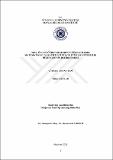Please use this identifier to cite or link to this item:
http://hdl.handle.net/11547/2379Full metadata record
| DC Field | Value | Language |
|---|---|---|
| dc.contributor.author | Sağlar, Bahar | - |
| dc.date.accessioned | 2019-05-30T10:26:24Z | - |
| dc.date.available | 2019-05-30T10:26:24Z | - |
| dc.date.issued | 2018 | - |
| dc.identifier.uri | http://hdl.handle.net/11547/2379 | - |
| dc.description.abstract | Çocukların önemli becerileri kazandığı kritik bir dönem olan okul öncesi dönemde, becerilerin kazanılmasında okul öncesi öğretmeni önemli bir role sahiptir. Bu dönemde çocuğun psikomotor, bilişsel, sosyal-duygusal ve dil gelişiminin yanı sıra yaratıcılık gelişiminin desteklenmesi onun, ileriki yıllarda yaşamını kolaylaştırması açısından önem taşımaktadır. Burdan yola çıkarak okul öncesi öğretmenlerinin öğrencilerde matematiksel yaratıcılığı teşvik etme öz yeterlilik düzeylerinin belirlenmesi bu araştırmanın amacını oluşturmaktadır. Araştırma karma modelde olup, nitel ve nicel araştırma yöntemleri kullanılmıştır. Araştırmanın evreni İstanbul ili, örneklemi ise Bahçelievler ve Küçükçekmece ilçeleri olarak belirlenmiştir. Veri toplama aracı olarak Öğretmen Öz Değerlendirme Ölçeği ve Yarı-yapılandırılmış Öğretmen Görüşme Formu kullanılmıştır. Araştırma sonucunda öğretmen öz değerlendirme ölçeği toplam puan ortalaması ise (X = 3.89) şeklinde olduğu bulunmuştur. Alt boyutlara bakıldığında ise en düşük ortalamanın Matematiksel Yaratıcılığı Geliştirici Öğretimsel Yöntemler konusunda olduğu görülmektedir. Öğretmen Öz Değerlendirme Ölçeği öz-yeterlilik puanlarının kıdeme göre Öğretim Tasarımı Hazırlayabilme boyutunda farklılaştığı görülmektedir (p<0,05). Bu farklılaşmaya göre 25-30 yıllık öğretmenlerin lehine yöneliktir. Öğretmen Öz Değerlendirme Ölçeği öz-yeterlilik puanlarının görev yapılan okul türüne göre de farklılık olduğu görülmektedir (p<0,05). Bu farklılaşmaya göre devlet okulunda görev yapan öğretmenlerin öz yeterlilik puanları, özel okulda görev yapan öğretmenlerin öz yeterlilik puanlarından daha yüksek olduğu belirlenmiştir. Ölçeğin diğer alt boyutlarından biri olan “Matematiksel Yaratıcılığı Geliştirici Öğretimsel Yöntemler” boyutunda ise özel okulda görev yapan öğretmenlerin öz yeterlilik puanlarının, devlet okulunda görev yapan öğretmenlerin öz yeterlilik puanından daha yüksek olduğu görülmüştür (p<0,05). Nitel araştırma bulgularına göre okul öncesi öğretmenlerinin matematiksel yaratıcılığı teşvik etmeye yönelik olarak benzer yöntemleri ve etkinlik temalarını tercih ettikleri ayrıca yaratıcılığı engelleyen tutum ve davranışların bilincinde oldukları sonucuna ulaşılmıştır. | tr_TR |
| dc.language.iso | tr | tr_TR |
| dc.publisher | İSTANBUL AYDIN ÜNİVERSİTESİ SOSYAL BİLİMLER ENSTİTÜSÜ | tr_TR |
| dc.subject | Okul Öncesi Eğitim | tr_TR |
| dc.subject | Yaratıcılık | tr_TR |
| dc.subject | Matematiksel Yaratıcılık | tr_TR |
| dc.subject | Öz Yeterlilik | tr_TR |
| dc.title | OKUL ÖNCESİ ÖĞRETMENLERİNİN ÖĞRENCİLERDE MATEMATİKSEL YARATICILIĞI TEŞVİK ETME ÖZ YETERLİLİK DÜZEYLERİNİN BELİRLENMESİ | tr_TR |
| dc.type | Thesis | tr_TR |
| dc.description.abstractol | The preschool period is a critical period in which children gain important skills. Preschool education plays an important role in the acquisition of these skills. Supporting the child's psychomotor, cognitive, social-emotional and language development as well as the development of creativity in this period is important in terms of facilitating her life in the future years. The purpose of this research is to determine the self-efficacy levels of pre-school teachers to encourage mathematical creativity in students. The research is a mixed model, qualitative and quantitative research methods are used. The universe of the study was determined as İstanbul and the sample was as Bahçelievler and Küçükçekmece districts. The Teacher Self- Assessment Scale and Semi-structured Teacher Interview Form were used as means of collecting the data. As a result of the research, it was found that the teacher selfevaluation scale had a total score average (X = 3.89). When we look at the subdimensions, it is seen that the lowest average is in Mathematical Creativity Enhancing Instructional Methods. Teacher Self-Evaluation Scale self-efficacy scores differed according to seniority in the dimension of Preparing Instructional Design (p <0.05). This is based on the differentiation of 25-30 years of teachers. Self-efficacy scores of the Teacher Self-Evaluation Scale are also different according to the type of school being employed (p <0.05). According to this differentiation, teachers' selfefficacy scores in public school were found to be higher than self-efficacy scores of teachers in private school. In the dimension of "Instructional Methods of Developing Mathematical Creativity" which is one of the other sub-dimensions of the scale, it was seen that self-efficacy scores of teachers working in private school were higher than self-efficacy scores of teachers working in public school (p <0.05). Qualitative research findings suggest that pre-school teachers prefer similar methods and activities to encourage mathematical creativity, and that they are aware of attitudes and behaviors that inhibit creativity. | tr_TR |
| dc.publisher.firstpagenumber | 1 | tr_TR |
| dc.publisher.lastpagenumber | 84 | tr_TR |
| Appears in Collections: | Tezler -- Thesis | |
Files in This Item:
| File | Description | Size | Format | |
|---|---|---|---|---|
| 512875.pdf | 2.14 MB | Adobe PDF |  View/Open |
Items in DSpace are protected by copyright, with all rights reserved, unless otherwise indicated.
